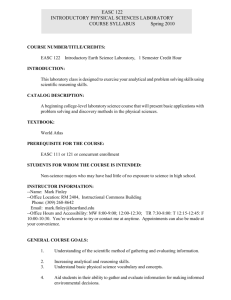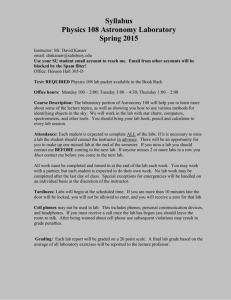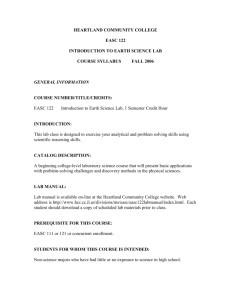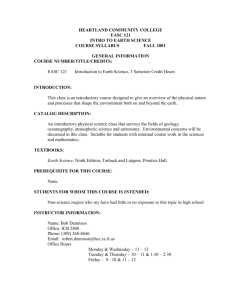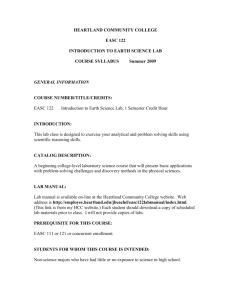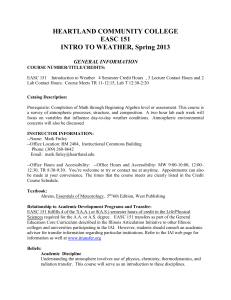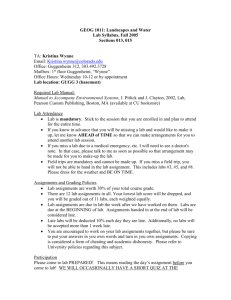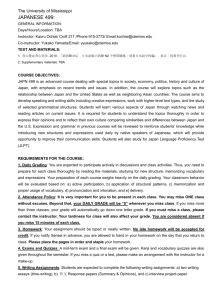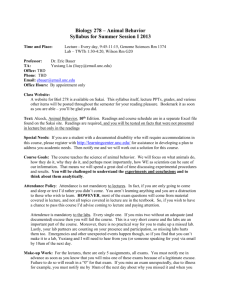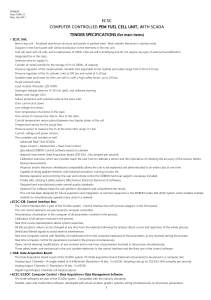EASC 122 stroyls - Heartland Community College
advertisement
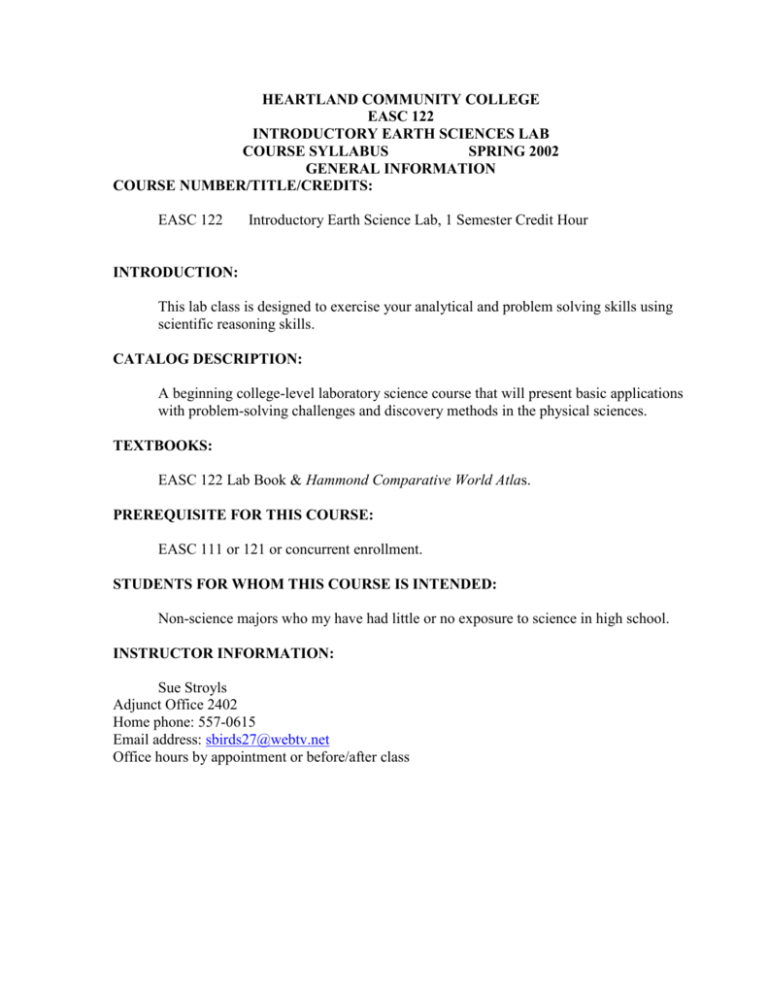
HEARTLAND COMMUNITY COLLEGE EASC 122 INTRODUCTORY EARTH SCIENCES LAB COURSE SYLLABUS SPRING 2002 GENERAL INFORMATION COURSE NUMBER/TITLE/CREDITS: EASC 122 Introductory Earth Science Lab, 1 Semester Credit Hour INTRODUCTION: This lab class is designed to exercise your analytical and problem solving skills using scientific reasoning skills. CATALOG DESCRIPTION: A beginning college-level laboratory science course that will present basic applications with problem-solving challenges and discovery methods in the physical sciences. TEXTBOOKS: EASC 122 Lab Book & Hammond Comparative World Atlas. PREREQUISITE FOR THIS COURSE: EASC 111 or 121 or concurrent enrollment. STUDENTS FOR WHOM THIS COURSE IS INTENDED: Non-science majors who my have had little or no exposure to science in high school. INSTRUCTOR INFORMATION: Sue Stroyls Adjunct Office 2402 Home phone: 557-0615 Email address: sbirds27@webtv.net Office hours by appointment or before/after class COURSE PURPOSE GENERAL COURSE GOALS: 1. 2. 3. 4. Understanding of the scientific method by observing. gathering, and evaluating information. Increasing analytical and reasoning skills. Understanding basic physical science terms and concepts. Aiding students in their ability to assess and make informed environmental decisions. RELATIONSHIP OF COURSE TO STUDENT ACADEMIC DEVELOPMENT EASC 122 provides a basic scientific laboratory foundation necessary for further college-level courses. RELATIONSHIP OF COURSE TO GENERAL EDUCATIONAL REQUIREMENTS This class will fulfill lab science credit in the A. A. and A. S. degree requirements. EDUCATIONAL BELIEFS: BELIEFS ABOUT STUDENT LEARNING: Students must take an active role in the learning process for it to take place and for you to feel a sense of accomplishment. Desire, effort, and persistence are the key ingredients to your success. BELIEFS ABOUT TEACHER’S ROLE: I will be responsible for creating an atmosphere conducive to the learning process. Please feel free to ask me questions either during your lab period or my office hours or whenever we can make a connection. DESCRIPTION OF INSTRUCTIONAL TECHNIQUES AND RATIONALE: Discussions, laboratory work, and written reports. Students will have the opportunity to ask questions and contribute throughout. DESCRIPTION OF LEARNING FORMAT: Students will be able to achieve success by: 1. Attending lab sessions regularly. 2. Participating in discussions and group work. 3. Asking questions about material you do not understand. 4. Doing careful, thoughtful and thorough work. 5. Not giving up on themselves. FEEDBACK AND GRADING GRADING SYSTEM/METHOD OF EVALUATION: The grade for this lab will be based solely on attendance, participation, and completion of lab work. You must attend the lab or field trip to get credit. You must also participate in the work done during lab and hand in the assignment associated with a field trip to get full credit. Any homework must also be handed in on time. A B C D you may miss 2 labs you may miss 4 labs you may miss 5 labs you may miss 6 labs If you know ahead of time that you are going to have to miss a lab or field trip, talk with the instructor to see if there is an alternate lab you can attend. You are urged not to deliberately skip coming to any of the labs or field trips. GENERAL INFORMATION 1. come to lab regularly and ON TIME 2. Bring your lab book, atlas and pencils with you each time. 3. Work cooperatively in small groups as assigned. Every student should record answers in their own lab book. 4. No extra credit is accepted. 5. We will not take a break during lab. If you need to use the restroom or get a drink, quietly leave the room without asking permission. Return as soon as possible. 6. When lab work is completed, even if shorter than scheduled, you are free to leave. 7. There will be minimal homework. Most work will be completed during the scheduled lab time. There will be a couple of assignments at the beginning of the semester where you will collect data in lab and then be required to write-up your findings at home. These papers must be typed, using complete sentences and good grammar. After each field trip, you will be required to write up a short report to be handed in. Again, these must be typed using good grammar and complete sentences. 8. Field trips will occur early in Fall SUPPORT SERVICES LIBRARY POLICIES: Students may use the library here at Heartland and will be informed by the instructor of the services available to them. LEARNING ASSISTANCE POLICIES: If additional assistance is necessary outside of class, please contact me as soon as possible. Tutoring can be arranged through Student Services. CURRICULAR AND TRANSFER STATUS DEGREE/CERTIFICATE: This course counts toward completion of the A. A. Degree or the A. S. Degree. TRANSFERABILITY: Check with an advisor to get specific transfer information related to the school you wish to attend. STUDENT ASSIGNMENTS AND PURPOSE RELATIONSHIP OF COURSE GOALS TO ASSIGNMENTS: Each assignment provides background needed to achieve course goals. RATIONALE FOR COURSE CONTENT: Course content covers science fundamentals and basic laboratory techniques necessary for more advanced science courses. Topics in the class will increase earth-environment awareness. WHAT STUDENTS NEED TO BRING TO EACH LAB MEETING: 1. 2. 3. 4. Pencil and pen Calculator Hammond Atlas Lab Book CALENDAR & LAB ASSIGNMENTS WEEK 1 Introduction, Scientific Method, Reaction Time WEEK 2 Soil and Water Differential Heating WEEK 3 Metric Sets WEEK 4 Geography WEEK 5 Weather and Oceanography WEEK 6 Topographic Maps WEEK 7 Plate Tectonics and Volcanoes WEEK 8 Earthquakes WEEK 9 Minerals WEEK 10 Rocks and Fossils WEEK 11-16 Field trips-to be determined SCIENTIFIC METHOD FORMAT INTRODUCTION Explain the project we did in lab. HYPOTHESIS Explain what you hope to prove. It can be something you think will be true or will not be true. EXPERIMENT Describe in detail what we did in class RESULTS Explain your results. State whether you were right or wrong but what you set out to prove. Your results can be positive or negative. DISCUSSIONS Explain why you think you got the results you did. Describe anything you or another scientific group repeating your experiment could change to test your hypothesis further
